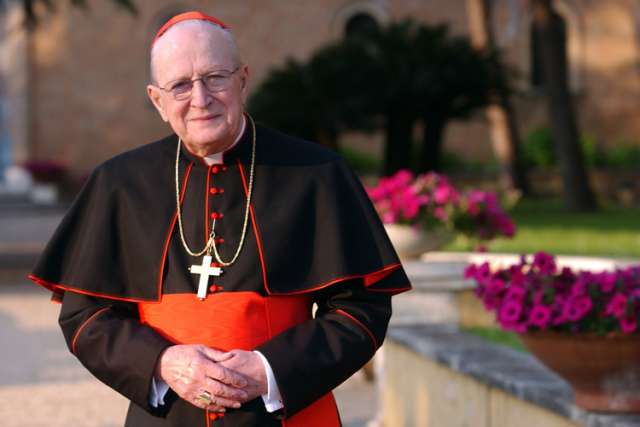His death leaves the College of Cardinals with 210 members, 117 of whom are under 80 and therefore eligible to vote in a conclave to elect a new pope.
Funeral arrangements will be made public as they become available.
While his accomplishments were often larger-than-life, Cardinal Szoka carried lessons learned growing up poor in hard-working Polish-American communities with him as he served as parish pastor, chancery official, founding bishop of a new diocese, archbishop of Detroit and in high Vatican posts.
Then-Archbishop Szoka was installed to head the Detroit Archdiocese in 1981. He was named a cardinal in 1988, and was Detroit's archbishop until 1990, when he began a 16-year tenure at the Vatican, serving under Popes John Paul II and Benedict XVI. In 1990, he was appointed president of the Prefecture for Economic Affairs of the Holy See, the Vatican's budget management office, and seven years later was named president of the Pontifical Commission for the Vatican City State, a post he retired from in 2006.
Retired from active ministry since 2006, Cardinal Szoka had been living in Northville, and had recently been active again in the life of the archdiocese he once led.
"We mourn the loss of a dedicated shepherd," said Detroit Archbishop Allen Vigneron, who had served as a priest under Cardinal Szoka in the 1980s. "For 60 years, Cardinal Szoka gave himself totally to his priestly service of Christ and His Church. He has gone home to the heavenly Father with our prayers. May the Lord give him the reward of his labours."
Although he headed up one of the largest U.S. archdioceses and achieved acclaim for restoring the financial condition of the Vatican, he pointed to his role in setting up the Diocese of Gaylord in northern Michigan as the accomplishment that meant the most to him personally.
His episcopal motto — "To Live in Faith" — was one the cardinal took to heart.
"It is the perennial challenge the Church always faces, strengthening the faith of the people and helping them to live that faith fully and actively," he once said.
Edmund Casimir Szoka was born Sept. 14, 1927, in Grand Rapids to Polish immigrants Casimir and Mary Szoka. His father had immigrated from what is now Belarus; his mother from Poland.
He was ordained June 5, 1954, for the Marquette Diocese by Bishop Thomas Noa. As secretary to the bishop, in October 1962 he accompanied Noa to Rome for the first session of the Second Vatican Council.
In 1963, he was named the first bishop of Gaylord. To fund diocesan operations, he launched the Catholic Services Appeal, forerunner of a successful campaign he would start in the Detroit Archdiocese.
He was named to Detroit in 1981. In 1987, he hosted his friend and mentor, Pope John Paul, on a visit to Detroit and elsewhere in the archdiocese as part of a major U.S. papal trip.
In 1988, the year he was named a cardinal, he oversaw major changes at Sacred Heart Seminary with the addition of a graduate school of theology, plus a revamping of its undergraduate program and the addition of lay ministry programs.
In 1990, Pope John Paul named him president of the Prefecture for Economic Affairs of the Holy See. Faced with a budget crisis, he initiated reforms that stanched a 20-year flow of red ink, and set the course for healthy balance sheets for the rest of his time in the position and for several years thereafter.
In 1997, he was named president of the Pontifical Commission for Vatican City State — informally the "governor" — which put him in charge of a wide range of activities such as the Vatican Museums, and the microstate's mint, post office and police force.
On June 22, 2006, Pope Benedict accepted his resignation. In retirement, he returned to the Detroit. Until 2008, he remained a member of five Vatican congregations including the Congregation for Bishops and the Congregation for the Evangelization of Peoples.

